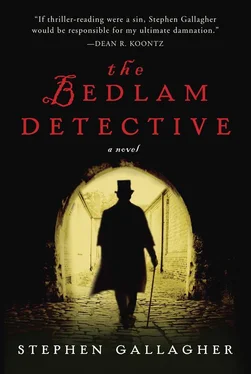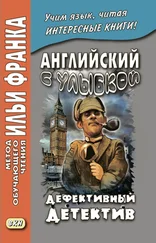Stephen Gallagher - The Bedlam Detective
Здесь есть возможность читать онлайн «Stephen Gallagher - The Bedlam Detective» весь текст электронной книги совершенно бесплатно (целиком полную версию без сокращений). В некоторых случаях можно слушать аудио, скачать через торрент в формате fb2 и присутствует краткое содержание. Жанр: Исторический детектив, на английском языке. Описание произведения, (предисловие) а так же отзывы посетителей доступны на портале библиотеки ЛибКат.
- Название:The Bedlam Detective
- Автор:
- Жанр:
- Год:неизвестен
- ISBN:нет данных
- Рейтинг книги:5 / 5. Голосов: 1
-
Избранное:Добавить в избранное
- Отзывы:
-
Ваша оценка:
- 100
- 1
- 2
- 3
- 4
- 5
The Bedlam Detective: краткое содержание, описание и аннотация
Предлагаем к чтению аннотацию, описание, краткое содержание или предисловие (зависит от того, что написал сам автор книги «The Bedlam Detective»). Если вы не нашли необходимую информацию о книге — напишите в комментариях, мы постараемся отыскать её.
The Bedlam Detective — читать онлайн бесплатно полную книгу (весь текст) целиком
Ниже представлен текст книги, разбитый по страницам. Система сохранения места последней прочитанной страницы, позволяет с удобством читать онлайн бесплатно книгу «The Bedlam Detective», без необходимости каждый раз заново искать на чём Вы остановились. Поставьте закладку, и сможете в любой момент перейти на страницу, на которой закончили чтение.
Интервал:
Закладка:
Stephen Gallagher
The Bedlam Detective
It is no good casting out devils. They belong to us,
we must accept them and be at peace with them.
D. H. LAWRENCE, The Reality of Peace 1917THE SOUTH-WEST OF ENGLAND
September 5 th,1912
ONE
Sebastian Becker’s train had been standing in this little English rural stop for fifteen minutes or more. When he looked out through his compartment’s window the view fogged and cleared, fogged and cleared, adding an illusion of movement as the locomotive’s idling boiler vented its unused energies and a breeze drove the cloud vapor on down its flanks. Sebastian saw a landscape of field and hedgerow, hedgerow and West Country field, all the way out to the blue distant hills.
There was a railway guard working his way down the platform toward them, stopping at each compartment to ask the same question.
A glance around Sebastian’s companions in first class showed strangers, all. A fat man in tweeds. Two clerical men, and a woman with a child. The child was about eight years old and wore a sailor suit, much as Sebastian’s own son once had. A pint-sized sailor, on his way to the seaside. The plush fabric of the seat made the child’s bare legs itch. Whenever he squirmed his mother would reach for his arm and shake him, once, in silent remonstration.
She was a widow, still in the attire. The boy was pale and blue, like the cloth of his suit. It was as if he were his father’s only memorial, and she exercised her grief by keeping him scrubbed down to the marble.
She met Sebastian’s eye.
“Forgive me,” he said, and once more looked out the window.
How far were they now, from the sea? Fifteen, twenty miles?
The sprung latch on the carriage door opened with a sound like the bolt of a rifle. The door swung out and the train guard hauled himself up to stand on the footboard. He’d bypassed the third class compartment next door.
He was a man of some girth, and he was shining with perspiration. His thinning hair was the dark brown of a much younger man, but his thick mustache was mostly gray and ginger. He wore a watch chain and waistcoat and the uniform of the Great Western Railway.
“Pardon me,” he said breathlessly. “But is anyone here a medical man or an officer of the law?”
He spoke to the company in general but when his gaze lit upon Sebastian, his manner changed.
No one moved.
“I thought perhaps you, sir?” the guard persisted when Sebastian made no response.
Sebastian Becker could sense the eyes of everyone in the compartment upon him.
“I’m sorry, but no,” he said.
The guard seemed to hesitate, as if about to say something else. Then he accepted the rebuff and moved to withdraw.
One of the clerical men called after him.
“Excuse me,” he said, “but why have we stopped?”
“Just a slight problem in the baggage car, sir,” the train guard said. “The stationmaster and I are having a difference of opinion over what’s to be done about it.”
The door closed with a bang. And that was that.
There was some shifting and throat-clearing in the compartment, but apart from something murmured by the fat man no one spoke. Back in America, Sebastian thought, the guard’s departure would have been the cue for some lively speculation and debate between strangers. But here, there followed a strained and British silence.
The guard was repeating his question next door to the third class people, this time with no Pardon me .
Sebastian opened his book and pretended to read, but it was of no use.
Eventually he closed the book and got to his feet.
“Excuse me,” he said, and opened the compartment door to climb down after the guard.
SEBASTIAN HAD once seen half of a man’s head blown clean off, gone from the eye sockets up. It had been done from behind, with a shot from a hunting rifle at a range of inches. Two men held the victim’s arms and forced him to kneel. The man with the rifle called a warning as he fired, so that his friends might turn their faces away-not to be spared the sight, but to avoid the spray. Sebastian could do nothing. He was part of a mob that had, only minutes before, been a peaceful labor meeting. To drop his disguise would have been certain suicide.
Although his evidence had later helped to hang two of the men, the hour stood in his memory as one of shame. He might have intervened; he had not. The fact that he was a Pinkerton man and undercover, and that the mob would have turned on him in an instant, somehow counted for little after the event.
Others agreed. Complete strangers were generous with their views on how he could and should have acted. You could of said something abt. the sky and then taken the gun off the shooter when he was looking up and turned it onto him , wrote one correspondent. That is surely what I would of done in yr place . And after his court appearance, another with differing loyalties wrote, On your word two good men will hang. The scab only got what he deserved and some day so will you .
A return to England, the land of Sebastian’s birth, had been Elisabeth’s idea. She sold her jewelry to buy them steamer tickets. It meant a fresh start, but a step down in fortune. Sebastian Becker now lived in London, and drew his modest pay from the coffers of England’s Lord Chancellor.
They were not rich. But he had his one decent suit of clothes, and a certain authority. An agent of justice once again, he now served as the special investigator to the Masters of Lunacy.
“I WAS a detective once,” he said. “But a mere civil servant now.”
“Nevertheless, sir,” the guard said, “I’ll ask you for your guidance and I’ll value your opinion.”
“On what?”
“Please. This way.”
As they began to move, he signaled to the stationmaster. The stationmaster saw the wave and broke off an argument with a third class passenger hanging out one of the end carriage windows.
The train was a cross-country set, pulled by a tank engine. A full quarter of its length was taken up by the luggage van. British holiday passengers rarely traveled light. They’d arrive at their lodgings in a caravan of trunks, suitcases, and hatboxes, more appropriate to a house move than a weeklong stay. Many would even pack food, as if a Minehead or a Weymouth were some far-off and foreign place with unreliable supplies.
But this was the season’s end. And a wet and disappointing season that 1912 summer had been. The train was less than half full.
As they walked up the platform the guard said, “I expect you’re wondering how I had you singled out, back there.”
“My travel warrant,” Sebastian said, to the guard’s disappointment. “I assume you noted the crest on it.”
The stationmaster caught up, and by the time they reached the luggage van they were four: Sebastian, the guard, the stationmaster, and the stationmaster’s gormless-looking lad who’d appeared from nowhere. The lad wore a porter’s uniform and a haircut that looked as if it had been inflicted on him in a dark alleyway. He couldn’t have been more than sixteen, but he was wiry.
“In here,” said the stationmaster, and once they were inside the station’s baggage room he closed the doors behind them and drew down the blinds.
There was a wall of numbered cubbies for bags and suitcases, but most of the room was open floor space for setting out baskets and dry goods. A second set of doors opened into a lane behind the station.
And there was a stink; a pungency somewhere between vinegar and turpentine, without quite being either. Sebastian knew it, and knew it far too well. It took him back to his first job in uniform, and memories of mortuary visits on hot summer evenings.
Читать дальшеИнтервал:
Закладка:
Похожие книги на «The Bedlam Detective»
Представляем Вашему вниманию похожие книги на «The Bedlam Detective» списком для выбора. Мы отобрали схожую по названию и смыслу литературу в надежде предоставить читателям больше вариантов отыскать новые, интересные, ещё непрочитанные произведения.
Обсуждение, отзывы о книге «The Bedlam Detective» и просто собственные мнения читателей. Оставьте ваши комментарии, напишите, что Вы думаете о произведении, его смысле или главных героях. Укажите что конкретно понравилось, а что нет, и почему Вы так считаете.












